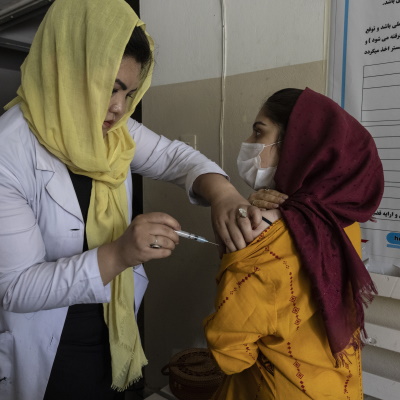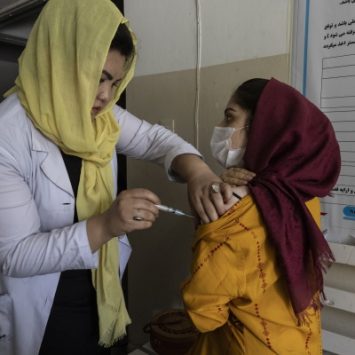
SciCheck Digest
Afghanistan has implemented a COVID-19 vaccination program and, although administration of vaccines has slowed due to internal armed conflicts, the program is still under way. But some prominent conservative purveyors of misinformation in the U.S. have made false claims about vaccination efforts and the impact of the pandemic in Afghanistan.
Full Story
Health care workers have administered just under 2 million COVID-19 vaccine doses in Afghanistan, which has a population of about 39 million. Vaccination rates slowed further in August amid upheaval as U.S. troops pulled out of the country and the Taliban took over.
 There was an 80% drop in the number of Afghans provided with the opportunity to receive COVID-19 vaccines in August, Tess Ingram, a spokeswoman for UNICEF, told us by email. UNICEF is handling the delivery of vaccines for the COVAX consortium that provides COVID-19 tests, treatments and vaccines to low- and middle-income countries.
There was an 80% drop in the number of Afghans provided with the opportunity to receive COVID-19 vaccines in August, Tess Ingram, a spokeswoman for UNICEF, told us by email. UNICEF is handling the delivery of vaccines for the COVAX consortium that provides COVID-19 tests, treatments and vaccines to low- and middle-income countries.
“COVID vaccine administration has slowed in the last month but hasn’t stopped completely,” Ingram said of the situation in Afghanistan.
But, as partisan rhetoric about the pull-out intensified, two prominent purveyors of misinformation made false or misleading claims about Afghanistan’s low vaccination rate and used those claims to suggest that vaccines aren’t necessary to stop the COVID-19 pandemic.
Ted Nugent, a musician who frequently shares conservative political commentary on social media and has made false claims undermining the COVID-19 vaccines, posted a meme on Facebook that asked, “Can someone tell me how the Taliban survived the last 18 months with no vaccines … to then recapture an entire country with no mass deaths amongst their population during a global pandemic?”
And Candace Owens, a conservative commentator who has been vocal about her aversion to the COVID-19 vaccine, tweeted: “Afghanistan has vaccinated approximately 2.4% of their population. (Source: Reuters) They are a nation of about 40 million people. Why aren’t they all dead? Why have they only recorded 7,083 deaths? Bigger question: Why is the Taliban banning the vaccines?”
The Taliban and the COVID-19 Vaccines
We’ll start with Owens’ claims.
There’s no evidence to support the claim that the Taliban is “banning the vaccines.” We reached out to Owens on her Facebook page and through her website to ask what her claim was based on, but she didn’t respond.

At the beginning of 2021, the Taliban gave its support to the COVID-19 vaccination drive backed by COVAX, and a Taliban spokesman told Reuters that the group would help “facilitate” the effort.
The Middle East Institute, a think tank based in Washington, D.C., called the Taliban’s attitude toward the COVID-19 vaccine “a departure from its usual position against immunization programs.” It noted that the Taliban has rejected vaccination programs in the past, including an effort to eradicate polio. Afghanistan is one of only two countries where polio is endemic, according to UNICEF.
Although the Taliban has said that it supports the COVAX effort, it appears to have interfered in some instances. In March, the group seized a shipment of COVID-19 vaccines in the northern province of Faryab, according to the vaccine alliance Gavi, one of the COVAX partners. And in August, an Afghan news outlet reported that the Taliban had shut down a COVID-19 vaccine distribution ward in the eastern province of Paktia.
But health care workers and aid organizations appear to be operating under the assumption that COVID-19 vaccines will continue to be available.
Sabrina Sidhu, another UNICEF spokeswoman, told us by email, “The [government] Health Commission, earlier this week, asked all health facilities to open, and all doctors, nurses and health workers, including women, to come back to work.” Also, a World Health Organization report issued on Sept. 2 said, “There is an urgent need to scale-up the COVID-19 response, especially vaccination.”
So, the Taliban does have a history of eschewing vaccination and reportedly has interfered in some instances with the distribution of COVID-19 vaccines. But we could find no evidence that the group has issued a ban at this point. Instead, we found that it has publicly stated support for the effort.
As for the claim in Nugent’s meme that there have been “no vaccines,” that’s clearly false, since the WHO has reported that just under 2 million doses have been administered.
Reporting COVID-19 Deaths in Afghanistan
The posts also suggest that the relatively low number of reported deaths from COVID-19 in Afghanistan indicate that vaccines aren’t necessary, which is at odds with data from countries that have widespread vaccination and death reporting programs.
The U.S., for example, saw a decline from a seven-day moving average of 2,703 deaths on Dec. 11 — the date on which the Food and Drug Administration issued the first emergency use authorization for a COVID-19 vaccine — to a low of 191 on July 8. There has been an increase in cases and deaths in the U.S., since the more transmissible delta variant became the most prevalent form of the virus.
But Afghanistan doesn’t have a national death register. That fact, paired with a lack of people being tested and limited public health resources generally, means that “confirmed cases of and deaths from COVID-19 are likely to be under-reported overall in Afghanistan,” a July report from the WHO and the United Nations Office for the Coordination of Humanitarian Affairs said.
Contrary to the social media posts, which downplay the severity of the COVID-19 situation in Afghanistan, the Centers for Disease Control and Prevention has put the risk level for traveling to the country at 3, or “high,” the second-highest level.
The U.S. embassy in Afghanistan, which is no longer operational, posted on its website, last updated Aug. 31: “New cases and deaths from COVID-19 have risen sharply throughout Afghanistan. Hospitals are reporting shortages of supplies, oxygen, and beds for both COVID-19 and non-COVID-19 related patients. U.S. citizens have reported being denied admittance to hospitals due to lack of space.”
Editor’s note: SciCheck’s COVID-19/Vaccination Project is made possible by a grant from the Robert Wood Johnson Foundation. The foundation has no control over FactCheck.org’s editorial decisions, and the views expressed in our articles do not necessarily reflect the views of the foundation. The goal of the project is to increase exposure to accurate information about COVID-19 and vaccines, while decreasing the impact of misinformation.
Sources
World Health Organization. Afghanistan Situation. Accessed 8 Sep 2021.
The World Bank. Population, total – Afghanistan. Accessed 8 Sep 2021.
Ingram, Tess. Spokeswoman, UNICEF. Email to FactCheck.org. 9 Sep 2021.
World Health Organization. COVAX. Accessed 8 Sep 2021.
Shalizi, Hamid and Abdul Qadir Sediqi. “Taliban backs vaccine drive as Afghan government receives $112 million funding pledge.” Reuters. 26 Jan 2021.
Kapur, Roshni. “The Afghan Taliban and Covid-19: Leveraging the Crisis or a Change of Heart?” Middle East Institute. 13 Apr 2021.
UNICEF. Polio eradication — programme. Accessed 9 Sep 2021.
Prabhu, Maya. “Resourceful Optimism: Fighting COVID-19 in Afghanistan.” Gavi. 20 Apr 2021.
The Week. “Taliban bans COVID-19 vaccine in Paktia: Report.” 14 Aug 2021.
Sidhu, Sabrina. Spokeswoman, UNICEF. Email to FactCheck.org. 8 Sep 2021.
World Health Organization. “AFGHANISTAN EMERGENCY SITUATION REPORT.” 2 Sep 2021.
Centers for Disease Control and Prevention. Trends in Number of COVID-19 Cases and Deaths in the US Reported to CDC, by State/Territory. Accessed 9 Sep 2021.
The United Nations Office for the Coordination of Humanitarian Affairs. AFGHANISTAN Strategic Situation Report: COVID-19 No. 100. 1 Jul 2021.
Centers for Disease Control and Prevention. COVID-19 in Afghanistan. Accessed 9 Sep 2021.
U.S. Embassy in Afghanistan. COVID-19 Information. Updated 31 Aug 2021.
The post Social Media Posts Mislead on COVID-19 Vaccines, Deaths in Afghanistan appeared first on FactCheck.org.
Source Link Social Media Posts Mislead on COVID-19 Vaccines, Deaths in Afghanistan
Leave a Reply